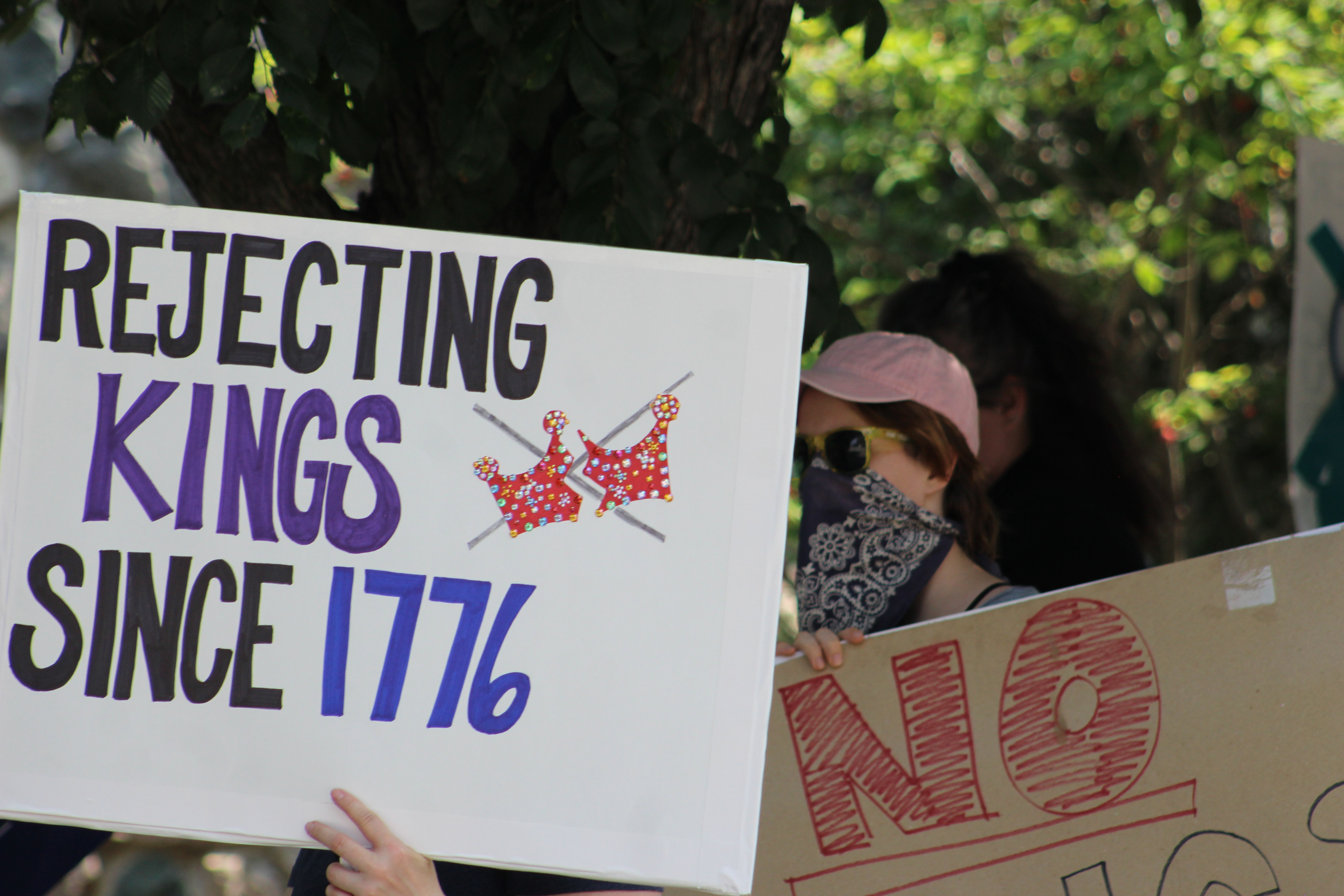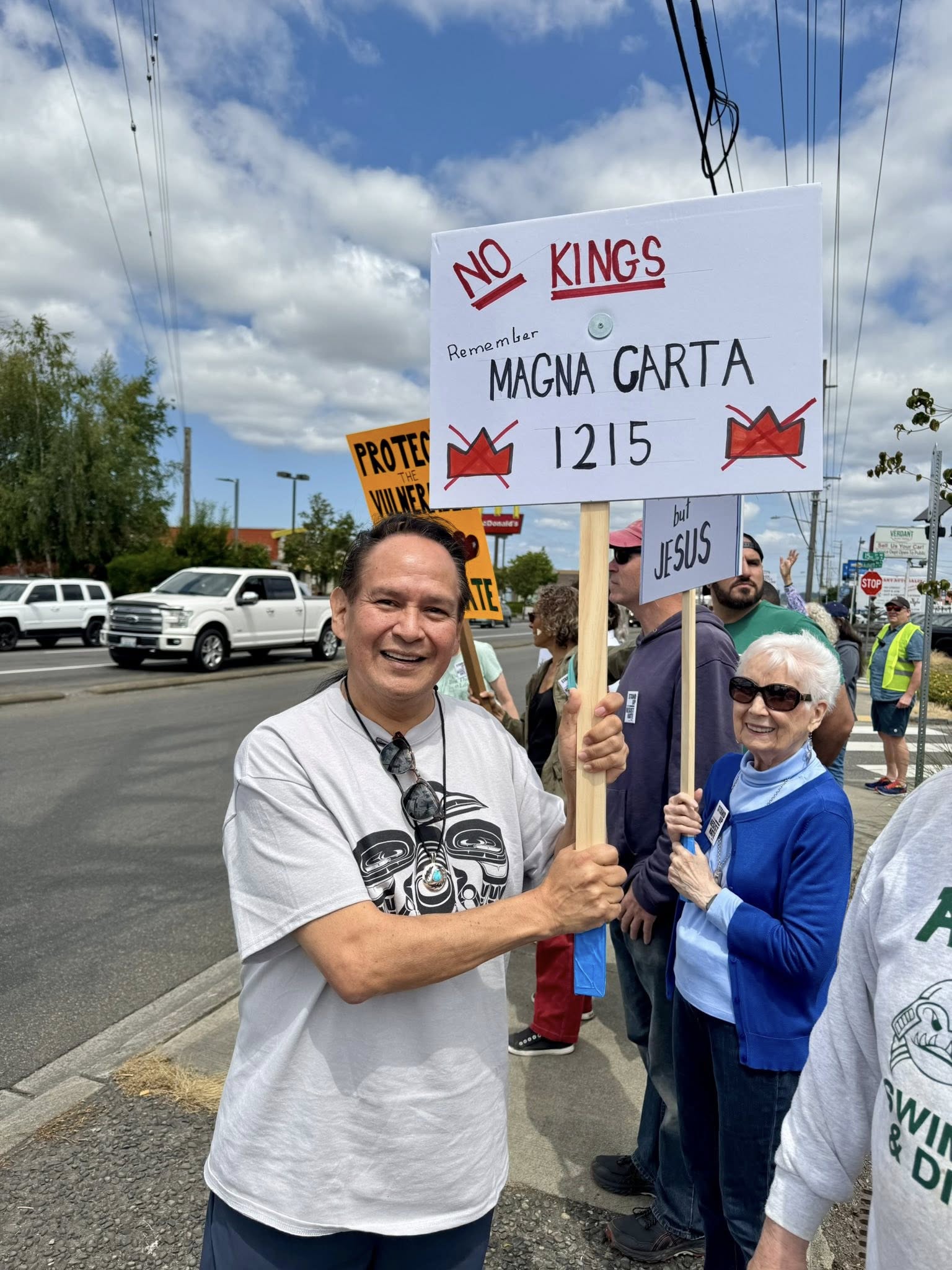
- Details
- By Levi Rickert
Opinion. After I left the Homecoming of the Three Fires Powwow on Saturday afternoon, I got caught in a traffic jam as I drove through downtown Grand Rapids.
Traffic was backed up because more than 10,000 “No Kings” rally protesters marched on sidewalks on both sides of Monroe Avenue. Chants of “This is what democracy looks like!” and “No Kings!” filled the air. The protest was peaceful. There was no riot. As a matter of fact, I saw a cluster of Grand Rapids Police officers smiling and waving at the marchers.
Borrowing from the chant, this is what democracy looks like to me.
Several protesters carried the American flag, perhaps to let MAGA folks know that the flag belongs to all of us. They do not define what patriotism is or what democracy looks like. A few others in the crowd waved the Mexican flag, similar to what I have seen at Mexican festivals in Grand Rapids in years past. The Mexican flags did not seem threatening or offensive to me, perhaps because I am so accustomed to seeing tribal flags carried at powwows out of pride and representation for tribal nations.
This is what democracy looks like to me.
Taking to the streets in a town that once voted mainly Republican, but voted for Vice President Kamala Harris in 2024, to show resistance to what protesters viewed as authoritarian overreach, gave me a deep sense of pride. The “No Kings” protest in downtown Grand Rapids was a powerful and unifying demonstration against perceived authoritarianism and the erosion of democratic norms under the current administration.
This is what democracy looks like to me.
Meanwhile, in the Pacific Northwest, Washington state House Speaker Pro Tempore Chris Stearns, a tribal citizen of the Navajo Nation, attended a No Kings rally in Auburn, Wash. He carried a sign that read: “No Kings: Remember Magna Carta 1215” — a reference to the document in English history that limited the power of the monarchy and established the principle that even the king was subject to the law.

At the Auburn rally were tribal members wearing ribbon skirts. One Native woman’s sign read: “No One is Illegal on Stolen Land.”
This is what democracy looks like to me.
On Saturday, across America, there were over 2,000 “No Kings” rallies with millions of people protesting. Thousands gathered in front of the Los Angeles City Hall, holding signs and listening to the rhythms of a Native American drum circle before marching through the streets. These protests were not merely acts of dissent but affirmations of the core values that define our republic.
The "No Kings" protests were organized by a coalition of over 100 organizations, including MoveOn, the American Civil Liberties Union, the American Federation of Teachers, and the Communications Workers of America. The demonstrations were a direct response to what many viewed as an alarming consolidation of power and disregard for democratic principles by President Donald Trump and his allies.
Participants in cities like New York, Los Angeles, San Diego, Atlanta and New Orleans carried signs reading "No Kings," "Democracy, Not Dynasty," and "Resist Fascism." In New York City alone, approximately 50,000 marchers filled Fifth Avenue, chanting and waving flags, despite inclement weather.
These protests were not confined to urban centers. In smaller towns and rural areas, citizens gathered to voice their concerns about issues such as immigration enforcement, political violence and civil liberties. The widespread participation underscored a collective desire to reclaim the democratic ideals that have long been the bedrock of American society.
The timing of the protests was significant. June 14 coincided with President Trump's 79th birthday and the 250th anniversary of the U.S. Army. In Washington, D.C., a grand military parade was held to celebrate these events, featuring tanks, helicopters and fireworks. The price tag for such a display will cost taxpayers between $25 million to $45 million.
For many, this display was emblematic of a troubling trend: the militarization of government and the blurring of lines between state and party.
The "No Kings" protests served as a counterpoint to this display, reminding the nation that power derives from the people, not from military might or executive decree.
This is what democracy looks like to me.
At its core, the "No Kings" movement is a call for accountability. It is a demand that elected officials uphold the Constitution, respect the rule of law, and govern with transparency and integrity. The protests highlighted concerns over executive overreach, the undermining of democratic institutions, and the prioritization of corporate interests over the welfare of citizens.
The tragic events in Minnesota, where two Democratic legislators and their spouses were shot, underscored the stakes of this struggle. While “No Kings” flyers were found in the suspect’s car, authorities said there were no direct links to the protests. The violence served as a stark reminder of the dangers of political polarization and the need for a return to civility and respect in public discourse.
The "No Kings" protests were a powerful reminder that democracy is not a passive institution but an active and ongoing endeavor. They demonstrated that when citizens perceive threats to their freedoms and values, they will rise up to defend them.
As we move forward, it is imperative that the voices of those who participated in these protests are heard and respected.
As I drove to downtown Grand Rapids, I wondered how many of the protesters will vote in the upcoming mid-term elections. I remembered the words of former President Barack Obama: “Don’t boo. VOTE!”
Voting is what democracy looks like to me!
Thayék gde nwéndëmen - We are all related.
More Stories Like This
Tribal Economic Development Programs in the Federal Contracting Environment: What They Are, and What They Are NotWhy Redefining Public Health Degrees Would Harm Native and Rural Communities
The SAVE America Act Threatens Native Voting Rights — We Must Fight Back
The Presidential Election of 1789
Cherokee Nation: Telling the Full Story During Black History Month
Help us defend tribal sovereignty.
At Native News Online, our mission is rooted in telling the stories that strengthen sovereignty and uplift Indigenous voices — not just at year’s end, but every single day.
Because of your generosity last year, we were able to keep our reporters on the ground in tribal communities, at national gatherings and in the halls of Congress — covering the issues that matter most to Indian Country: sovereignty, culture, education, health and economic opportunity.
That support sustained us through a tough year in 2025. Now, as we look to the year ahead, we need your help right now to ensure warrior journalism remains strong — reporting that defends tribal sovereignty, amplifies Native truth, and holds power accountable.
 The stakes couldn't be higher. Your support keeps Native voices heard, Native stories told and Native sovereignty defended.
The stakes couldn't be higher. Your support keeps Native voices heard, Native stories told and Native sovereignty defended.
Stand with Warrior Journalism today.
Levi Rickert (Potawatomi), Editor & Publisher


